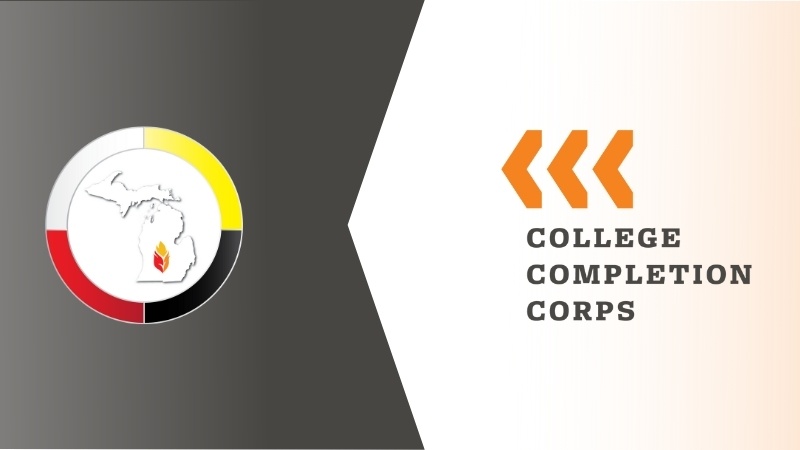
LANSING, Mich. — Michigan College Access Network (MCAN) has been awarded a $55,000 grant from the Native American Heritage Fund (NAHF) to improve completion rates at Michigan’s three tribal colleges. MCAN’s College Completion Corps initiative will use the funding to support AmeriCorps members at Saginaw Chippewa Tribal College, Keweenaw Bay Ojibwa Community College and Bay Mills Community College.
Launched in 2020, College Completion Corps places AmeriCorps members who serve as coaches on campuses across Michigan, supporting students by helping them foster connections, establish a sense of belonging and build self-efficacy as they navigate the college experience. The program’s goal is to increase retention and completion rates, with a focus on first-generation college-going students, low-income students and students of color. College Completion Corps currently supports 22 members on 18 partner campuses.
“It’s an honor to continue this partnership with Michigan’s tribal colleges to support Indigenous students,” said Ryan Fewins-Bliss, MCAN executive director. “We’re thankful for the continued support of the Native American Heritage Fund, which is helping us move the needle on postsecondary completion for tribal colleges students and giving more Indigenous students access to greater economic opportunities after they graduate.”
Keweenaw Bay Ojibwa Community College and Saginaw Chippewa Tribal College have hosted College Completion Corps coaches since the program’s launch, with Bay Mills Community College joining in 2021.
“MCAN’s partnership with Keweenaw Bay Ojibwa Community College means success for our students,” said Lori Ann Sherman, president of Keweenaw Bay Ojibwa Community College. “The program gives our students much needed support and access to resources. In many cases, it could mean the difference between our students succeeding or dropping out of school. Our coaches have been top notch and have found ways to reach out to our students even during the pandemic. Our current coach is very familiar with our college and our student body, and we are excited to see where she can take this program.”
“We are very excited about our renewed partnership with MCAN and the assistance from the NAHF grant, which will allow us to continue to provide additional high-quality student support services and resources that are specific to the demographics and experiences of our student population,” said Wendy Heyrman, vice president of student affairs for Bay Mills Community College. “These support services will help us increase the number of students achieving their educational goals and success here at Bay Mills Community College. Our coach has been able to provide personalized assistance and support for students while building improved connections.”
“Saginaw Chippewa Tribal College is very excited to continue our partnership with MCAN, with support from the Native American Heritage Fund,” said Amanda Flaugher, dean of students for Saginaw Chippewa Tribal College. “In the short time a coach has been placed on our campus, we have witnessed the benefits of offering our students individualized student support. This grant will allow for all tribal college students in the state of Michigan to have access to a coach and the individualized student support that the coach provides. Programming opportunities that are designed to assist Native American students in success and completion are valued, and programs that do this by allowing students to receive individualized attention are treasured. Saginaw Chippewa Tribal College is eager to share the impact this opportunity has had on our students’ success.”

Pictured above, left to right: NAHF Secretary Liz Kinnart, Sault St. Marie Tribe of Chippewa Indians; Bay Mills Community College President Duane Bedell; Saginaw Chippewa Tribal College President Carla Sineway; MCAN Executive Director Ryan Fewins-Bliss; NAHF Chair Jamie Stuck, Nottawaseppi Huron Band of the Potawatomi Tribal Council chairperson; NAHF Treasurer: Melissa Kiesewetter, Michigan Department of Civil Rights tribal liaison/Native American specialist. Lori Sherman, president of Keweenaw Bay Ojibwa Community College, was not able to attend the presentation.
LAND ACKNOWLEDGEMENT
MCAN acknowledges that the land upon which we operate today occupies the ancestral, traditional and contemporary lands of the Anishinaabe - Three Fires Confederacy of Ojibwe, Odawa, and Potawatomi peoples. In particular, MCAN’s office resides on land ceded in the 1819 Treaty of Saginaw. We recognize, support and advocate for the sovereignty of Michigan’s 12 federally-recognized Indian nations, for historic Indigenous communities in Michigan, for Indigenous individuals and communities who live here now and for those who were forcibly removed from their homelands.
ABOUT THE NATIVE AMERICAN HERITAGE FUND
The NAHF was established in 2016 as part of the Second Amendment to the Tribal-State Gaming Compact between the Nottawaseppi Huron Band of the Potawatomi (NHBP) and the State of Michigan. The amendment allowed for a portion of NHBP’s annual state revenue sharing payment to be deposited into the NAHF. The fund serves to promote positive relationships between public and private K-12 schools, colleges, universities, local units of government and Michigan’s federally recognized Native American Tribes. The NAHF provides resources to help improve curricula and educational resources related to Michigan Indian history, as well as to replace or revise mascots and imagery that may be deemed as offensive to or inaccurately conveying the culture and values of Native Americans. For more information, visit: nahfund.com.
Funds will support College Completion Corps coaches at Michigan’s three tribal colleges